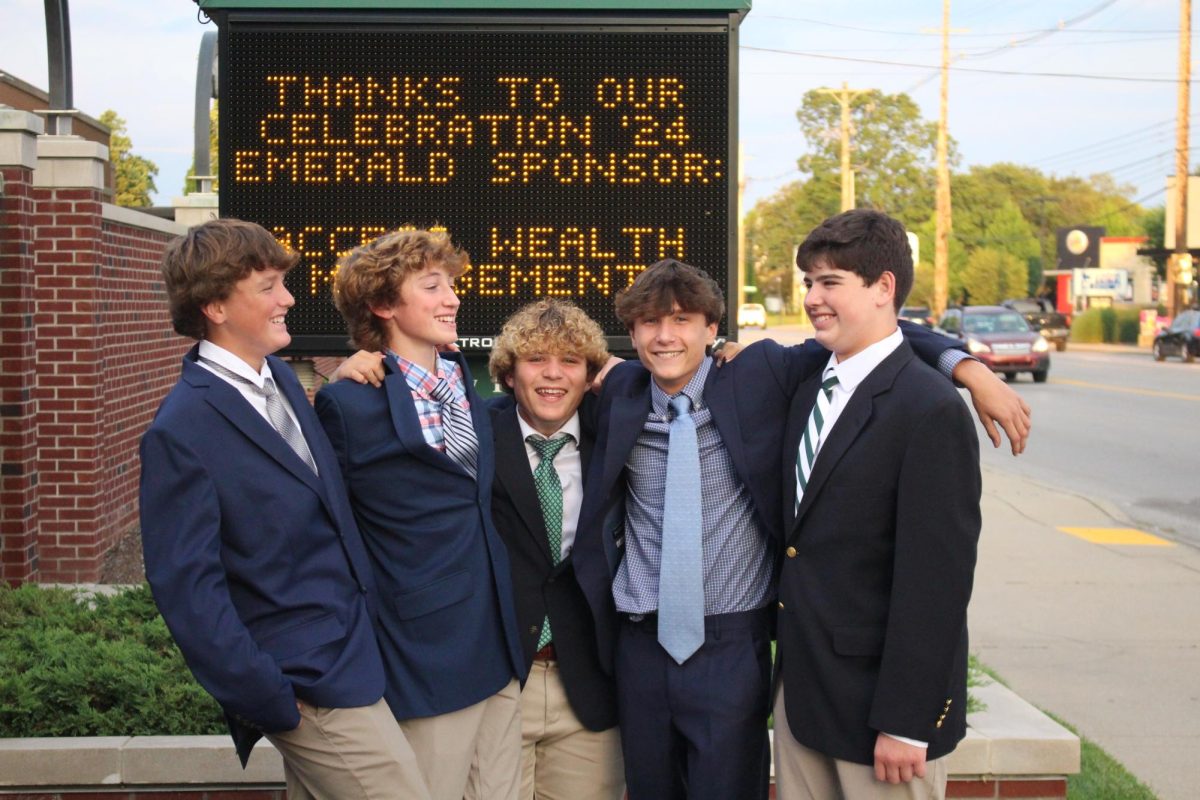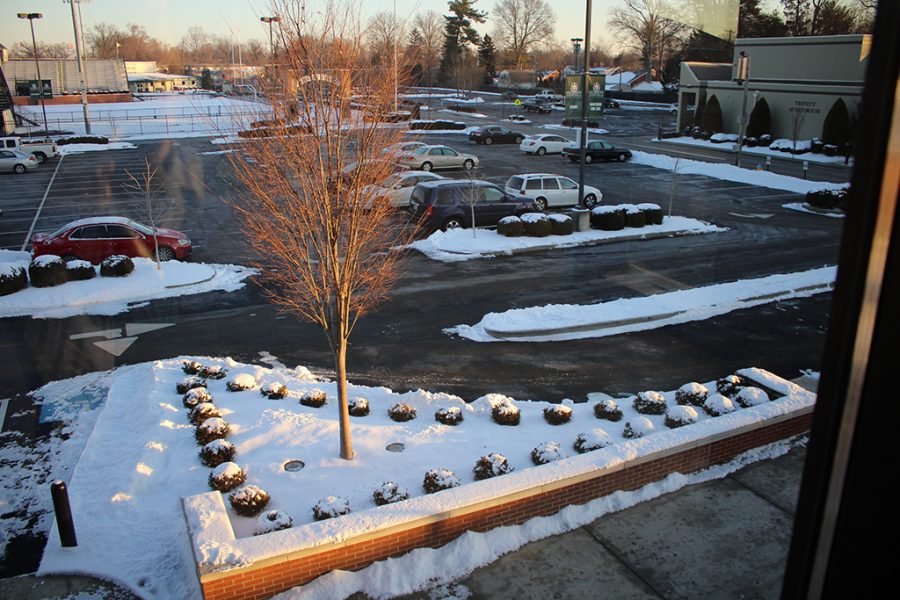Religion is the number-one topic to avoid at dinner parties, with politics being a close second. Trinity is first and foremost a Catholic high school. But religion is not a topic avoided at Trinity. Among the Trinity population are Catholics, Buddhists, Jews, Muslims, Episcopalians, Methodists, Presbyterians, and Baptists. Different denominations of Christianity dominate the list, not only at Trinity but also around the world. The 20 major religions and countless smaller religions and cults around the world all claim to have the secrets to life and the afterlife, but who is right? It depends on who you ask. Additionally, a large percentage of the world’s population has no religious affiliation. They may be described as atheists, who reject belief in God, or agnostics, who do not reject the belief of God or heaven, but believe it is impossible to know for certain if they exist. The Central Intelligence Agency completed a study in 2007 that took a worldwide poll of the popularity of the major religions in the world. The results were Muslim (21 percent), Catholic (16.99 percent), Hindu (13.26), Buddhist (5.84), Protestant (5.78), Orthodox (3.53), Anglican (1.25), other Christians (5.77), other religions (11.78), Jewish (0.23), Sikh (0.35), Baha’is (0.12), non-religious (11.77) and atheists (2.32). Atheism is on the rise. The Global Index of Religiosity and Atheism poll found, on average, that 13 percent of the world’s population identified themselves as atheists in 2012. A 2005 poll of 39 nations found 4 percent of the people were atheists. Those same 39 nations had a 7 percent atheism rate in the 2012 poll. In the United States, 5 percent identified themselves as atheist, up from 1 percent seven years ago. Mr. Tom Dubay, a longtime theology teacher at Trinity, said of the growing rate of atheism, “I wonder if it’s just a phase. That once people settle down and have a family they will be drawn back to some type of religious belief system.” Senior Carter Simmons said religion has never played much of a role in his life. “I do not believe in an afterlife because I would rather make the most of what I have now and not waste my time waiting for an afterlife.” Senior Daniel Whitehead, a practicing Catholic, views things differently. Whitehead said, “I have grown up with (Catholicism), and ever since I can remember, I have gone to church with my family. My connection with God has gotten stronger the older I get.” Sophomore Zach Berger has similar views, saying, “Religion is important because it helps me to reflect on things when I am going through a hard time, through my prayers with God.” There are many people who have chosen to dedicate their lives to teaching Catholicism. Among them are Fr. Bill Hammer, Mr. Chris Luken, Mr. Scott Holzknecht, and Dubay. Many religious figures say they have a “calling” from God. When asked at what moment religion became important to Hammer, a priest for 31 years, said, “Growing up in my and mom and dad’s place, we spent time praying together and going to church. It was just a given. After college I graduated in December and wasn’t scheduled to go back until September. During those eight months, I volunteered at St. Basil Parish and at the Veteran’s Hospital. After those experiences I knew this is what I wanted to do.” Of deciding to dedicate his life to his faith, Hammer, who has spent the last seven years at St. Joseph Proto Cathedral in Bardstown, said, “I know I can’t understand God fully, but with the help of others, I have a better understanding. A group of people can do a lot more than one person when we pull our resources together. I like the idea of St. Paul when he said we are all one body. Organized religion helps me grow. They support me and help me see different perspectives.” Luken, a youth minister at Church of the Epiphany and now a theology teacher at Trinity, said religion became important to him in high school. “Freshman year of high school I had a really good religion teacher. He had passion for what he was teaching and knew what he was talking about. Having a good experience made me want to give that experience to others. I thought I was supposed to be a priest, but senior year I realized that wasn’t my path and that I was meant to be married and help other people gain a personal relationship with God.” Of the numerous Christian denominations, Luken said, “As long as the foundation is there, which is there is God and Jesus is the Messiah, then we’re all going to the same destination. We’re all just on different routes to get there. We have our core teachings, but on certain moral teachings like contraception, divorce, war, gay marriage, and capital punishment, we may not agree but are continually striving to get to that point of belief that the Church teaches, even if we never get there.” Holzknecht, who is chair of the Theology Department at Trinity and teaches Catholic social teachings and sophomore theology, had a very different journey with religion compared to Hammer and Luken. Holzknecht said, “Growing up I was spiritual. I remember in Mr. Dubay’s class I studied Catholicism with more intentions and my own free thoughts. Because of that class I thought (religion) was a joke and went home and told my parents I wasn’t going to go to church anymore and that I didn’t believe in God. (This) lasted well into college, but I suffered a lot in college and decided I needed to explore healthy ways of dealing with my suffering. So, from there I read Thomas Merton’s writings and studied abroad in Rome, where you can’t spit without hitting a church. I began to explore a new way of living that involved the presence of God.” Holzknecht said his journey included studying other religions. “I don’t think you can be a good Christian without have studying Judaism, and I have delved in to Mysticism.” Holzknecht studied Christianity, Zen, Judaism, and Sufism Mysticism. He said Mysticism is the experience with God, and theology is trying to explain the experience. He also described Mysticism as the engine, and theology as the steering wheel. He said both are important components. Holzknecht said, “Catholicism is like a family. We have our disagreements and get in fights. But we are all still a family and do the best we can. My job isn’t to be right; it is to be loving.” Dubay said his connection to God has always been a part of his life. He said, “My parents were always very involved in their church in Cleveland, Ohio, and I just grew up experiencing church as a normal activity.” When asked how he felt about his class being the reason Holzknecht pulled away from relgion in his early 20s, Dubay laughed to himself and said, “Part of it, I think, is teenagers question their religion as they establish their own identity. I think my classes encourage people to question. Ideally, then the students develop their own faith, which I think Holzknecht has done. When asked what he thought about people who attend Mass only on Christmas and Easter, Dubay said, “They make it hard to find a seat. On one hand, I think it’s good people are going to church, but I wonder if it’s more for religious reasons or social traditions.”
Categories:
Catholic Trinity High also a home for diverse religions
December 12, 2012
0



